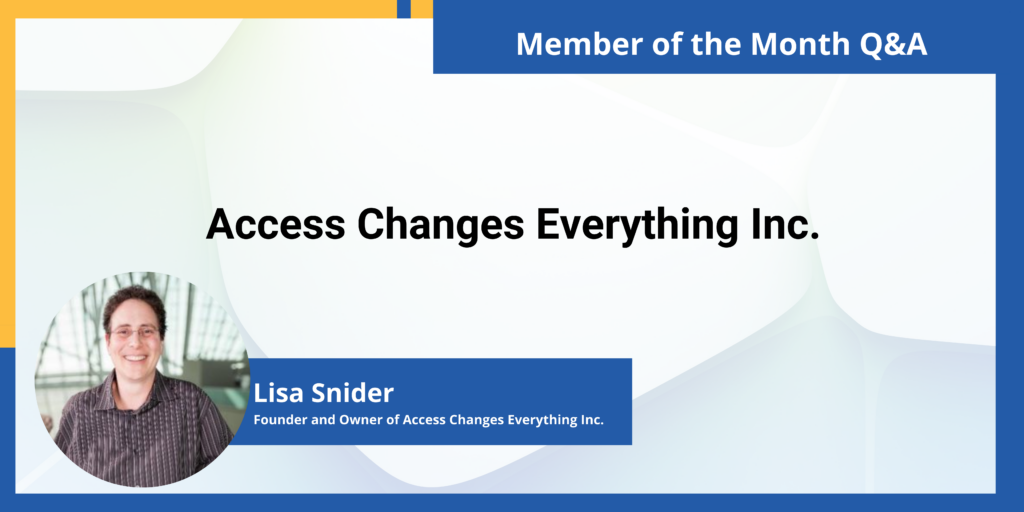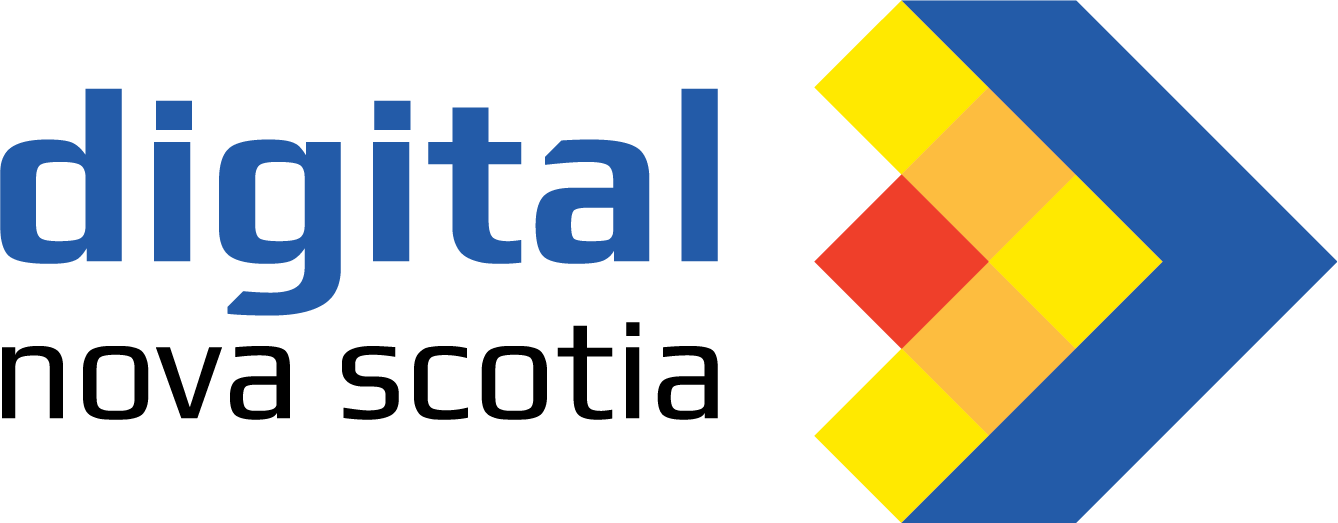
October 29, 2024
Lisa Snider is the Senior Accessibility Consultant, Trainer, and Owner of Access Changes Everything Inc. She works with clients to ensure their digital presence is accessible, including their social media, documents, audio, and video content. Lisa also offers a variety of training sessions on topics such as plain language and accessible communication, as well as creating accessible PDFs and PowerPoint presentations.
In this Q & A, Lisa shares her insights on how the digital accessibility landscape has evolved, highlighting the impact of AI and emerging technologies. She also discusses the challenges and progress made in Nova Scotia, a province she praises for its forward-thinking legislation and grant programs. For businesses beginning their digital accessibility journey, Lisa emphasizes the importance of gaining awareness, using available resources, and leveraging consulting expertise.
DNS: What inspired you to start Access Changes Everything Inc., and what was your journey into digital accessibility?
Lisa: “For over 20 years, my passion in life has been making the digital world more accessible for people with disabilities. I have done this work in different North American settings and contexts, as a web developer, archivist, and librarian.
The time was right in 2016 for me to start my consulting company. This allowed me to continue to make the digital world more accessible, as a senior digital accessibility consultant.
I share my knowledge with academic institutions, businesses, organizations, and governments through workshops, presentations, courses, training, facilitation, audits, research services, procurement consulting, etc. I love helping clients lower barriers for people with disabilities in websites, documents (PowerPoint, Word, Excel, PDF, etc.), audio, video, apps, email, e-books (EPUBs), social media, etc.”
DNS: How have you seen the landscape of digital accessibility evolve since you first started working in this field?
Lisa: “In the last 20 years, the digital realm has seen increased accessibility. Plus, there is more awareness of disability, and intersectionality, in general. Many of us identify as having disabilities, and are part of other communities. For example, in Nova Scotia, a person may have a disability and be part of the African Nova Scotian, or Mi’kmaq, communities.
I find that since the pandemic in 2020, there is more awareness of digital accessibility, and disability, than ever before. However, today, in the digital realm, many websites and apps, most documents, and many social media posts are still inaccessible. Plus, with the rapid pace of new, and improved, digital technologies, accessibility is getting worse in some ways. However, I also see many more people in the tech and IT sectors becoming more aware of accessibility and disability, and this gives me great hope for a more accessible future!”
DNS: You work with many diverse organizations—are there any specific industries or sectors that stand out for their commitment to accessibility, or where you see the most challenges?
Lisa: “I think everyone wants to see the digital, and physical, realms more accessible for everyone. People don’t always see how they can do it with the budget and resources they have to work with.
In some ways, it is easier for smaller businesses, organizations, municipalities, and academic institutions to make their digital materials more accessible, in a quicker fashion. Just because one is ‘small’, it doesn’t mean ‘big’ accessibility changes can’t be made!
I do have to thank the Province of Nova Scotia for their commitment to accessibility, in the form of grants. The Business ACCESS-Ability Grant Program is really a great resource for businesses. I have worked with many clients across Canada on similar grant funded projects, and they really do make a difference.”
DNS: In terms of provincial digital accessibility standards, how does Nova Scotia compare to other provinces?
Lisa: “I have been, and am currently, part of committees that draft different legislative standards in Canada. In terms of provincial accessibility legislation, Nova Scotia was third in Canada. The Nova Scotia Accessibility Act was made law in 2017. However, Nova Scotia has gone even further than any other province. It made the Dismantling Racism and Hate Act law in 2022, and brought out the associated Equity and Anti-Racism Strategy.
Nova Scotia is currently developing standards under the Accessibility Act. The two standards that will cover digital materials for most businesses, organizations, educational institutions, and governments, are the Goods and Services Standard, and Information and Communications Standard. The other standards may apply as well, but these two focus exclusively on the accessibility of both physical, and digital, information and communications.
For people who work in the federal realm, many federal standards are rapidly being developed, and some have been made official. In this realm, there are more than two standards that cover digital information and communications. The standards I would watch for in the next few months are the ones I work on, the Accessibility Requirements for ICT products (done 2024), Accessible and Equitable Artificial Intelligence Systems, and Design and Delivery of Programs and Services.”
DNS: In your experience, how do emerging technologies (like AI or machine learning) impact digital accessibility, both positively and negatively?
Lisa: “Artificial Intelligence (AI) is our friend and our enemy! AI can help us in making digital materials more accessible. For example, there is a new tool to help make alternative text descriptions for images from the image itself. However, the downside is that it can also create image descriptions that don’t take down barriers!
Today, we have many checkers, and AI is slowly being put into them. However, I think it will be three to five years until they help us lower barriers, and not create more of them! We also have to consider who is programming the AI. Are people with disabilities, and those from different communities, involved in the major decision making?
I am a member of the Federal Accessible and Equitable Artificial Intelligence Systems Standard development committee. Watch for this draft standard, because it will address the major concerns with AI, as well as its potential for good.”
DNS: What advice would you give to businesses looking to start their digital accessibility journey but aren’t sure where to begin?
Lisa: “The first step is to become aware of digital accessibility, and gain more knowledge and awareness about disabilities and technologies. This is crucial! The second step is figuring out what can be made more accessible, and how to make it more accessible. Both these steps depend on budget and resources.
Some businesses get free digital accessibility resources from the internet. Others work with consultants and companies. I work with many businesses, and share my knowledge through webinars, workshops, presentations, etc.”
DNS: Are there any upcoming projects or initiatives you’re excited about at Access Changes Everything Inc. that you can share?
Lisa: “I will be giving workshops, funded by a Business ACCESS-Ability Grant, for businesses, organizations and academic institutions in Nova Scotia very soon.
My auditors and I are starting to work on a website audit for a major American museum, and I am finishing a large scale PDF remediation project for a federal government entity.
I am also working with a couple of businesses across Canada on accessibility related customer surveys. I have done a lot of accessibility focused research work in the last 15 years and I love it!”
